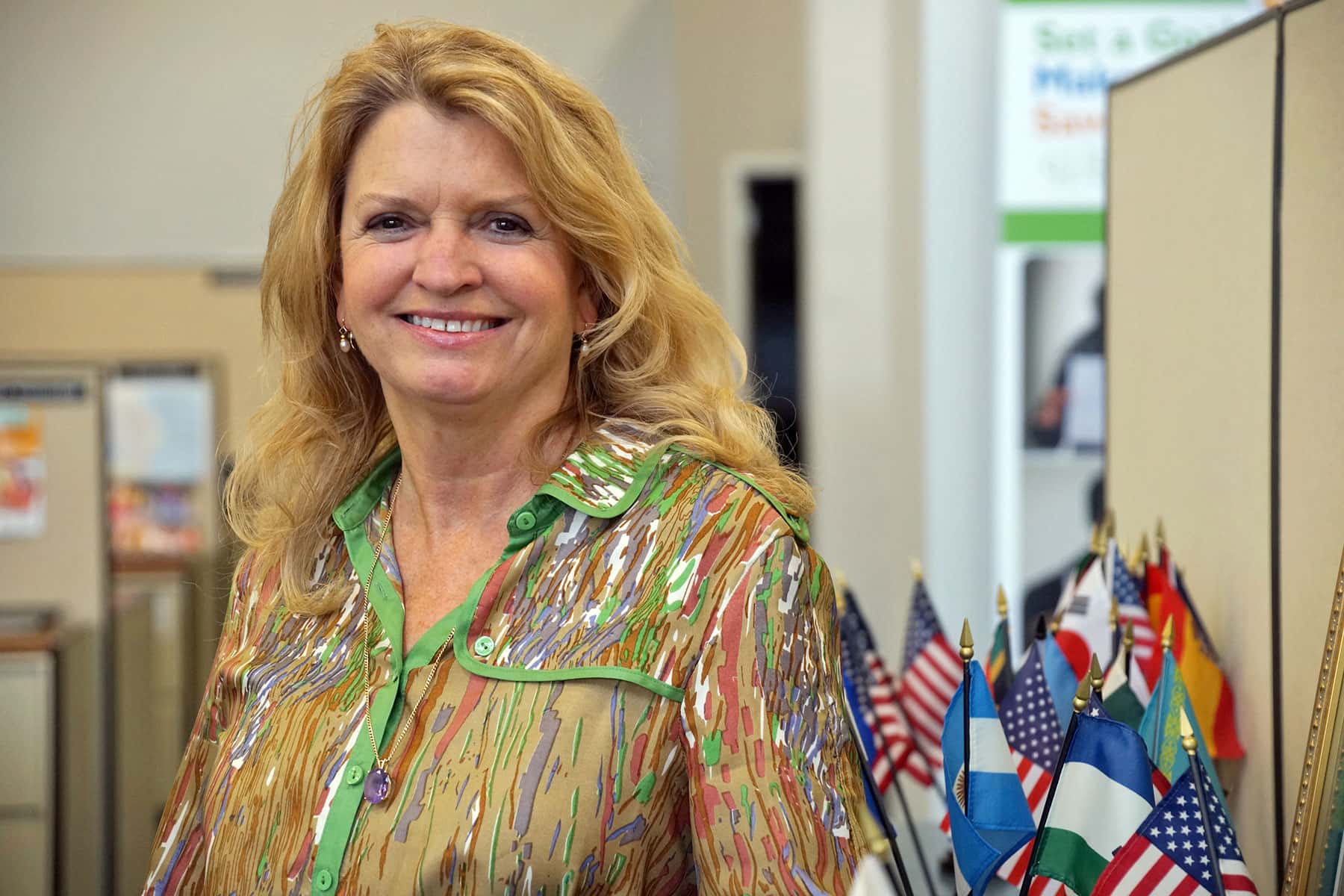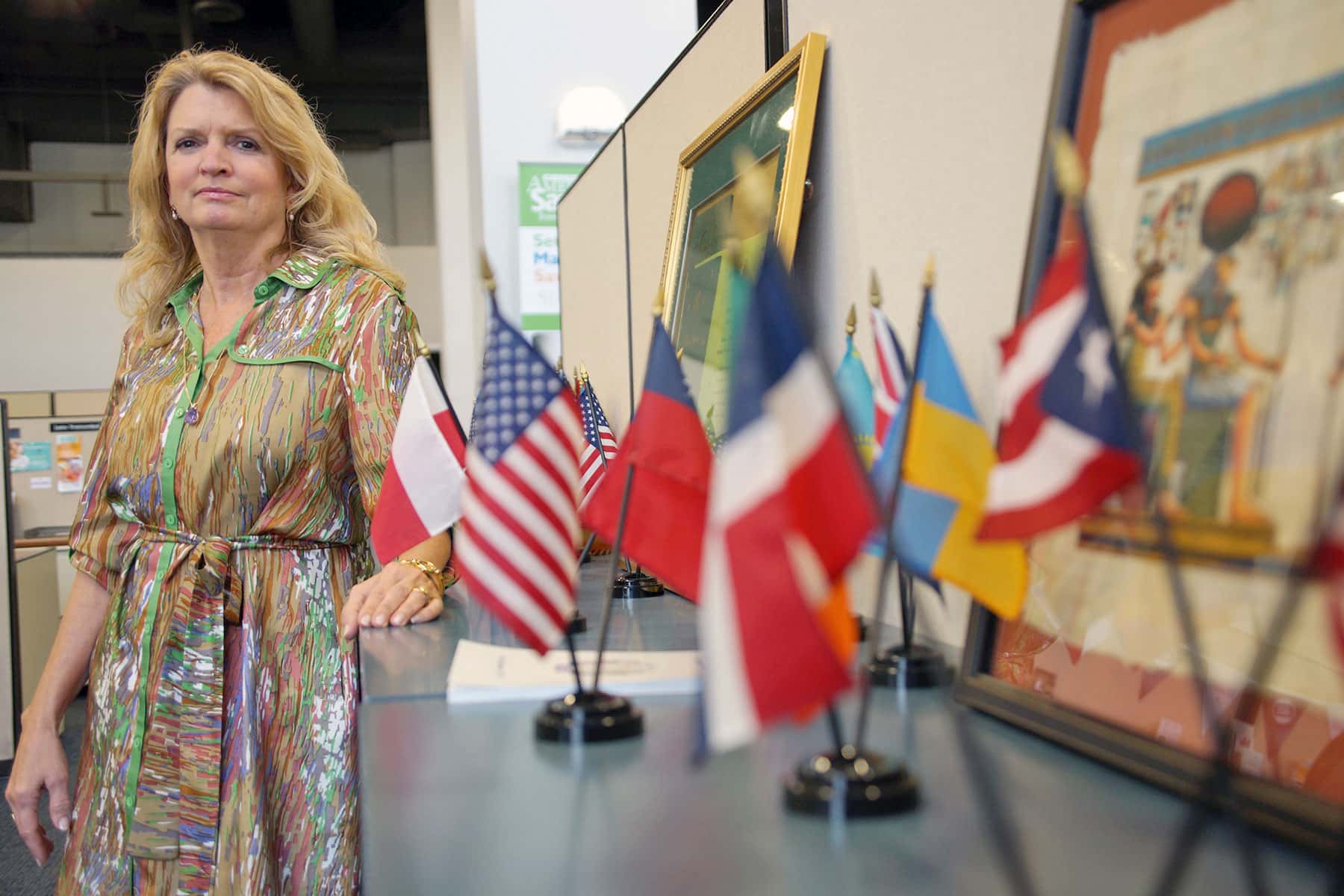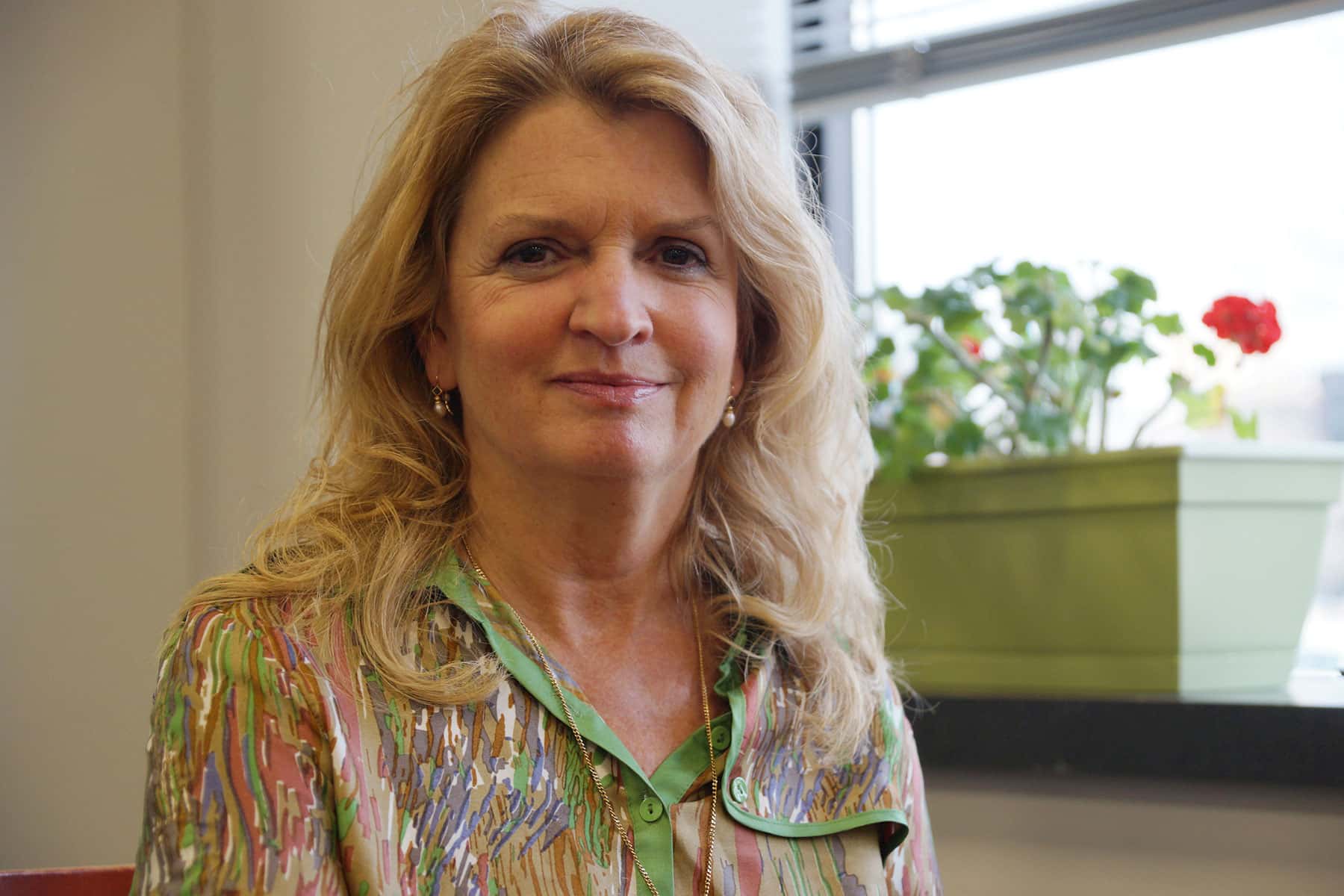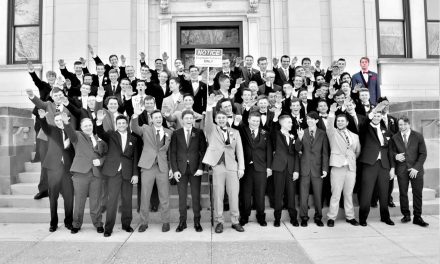
In her 23 years as executive director, Wendy Baumann has been instrumental in the success of Wisconsin Women’s Business Initiative Corporation (WWBIC). She has fought for a seat at the table with male-owned financial institutions, to support the business education and small loan institution.
Even though Wendy Baumann is technically not an entrepreneur, she has the spirit of one. With tenacity and a can-do attitude, the executive director has transformed the non-profit Wisconsin Women’s Business Initiative Corporation (WWBIC) from a company employing two people, herself included, to a successful enterprise of over 50 employees and four offices.
WWBIC primarily provides business education and fair capital to women and minorities in the Milwaukee community, as well as in Madison, Kenosha, and Racine, where their other offices are located. WWBIC has funded such Milwaukee businesses as Purple Door Ice Cream and Trocadero, and their small business loans and financial counseling have helped countless others.
More than two decades ago, Baumann started working as WWBIC’s executive director in a 3’ by 7’ office that also included a janitor’s slop sink. Despite her less-than-ideal office conditions, Baumann knew how big WWBIC could become.
“I felt that the organization was a diamond in the rough,” said Baumann. “I did not think that it was a small organization doing a few loans a year. I thought, ‘this is a big thing that needs to be there for those who can’t yet get financing from the bank, those who can’t afford to go to a university system and learn how to develop a business plan, and for those who maybe are more comfortable doing this within their community.’”
Like any other start-up, however, expanding WWBIC was difficult. Baumann had two young children at the time she started, and the hours were long and grueling. She told a story about the time she and her former vice-president Kathryn Dunn brought their laptops with them to Summerfest to write a proposal as they enjoyed the music.
“You need to do everything,” said Baumann. “You need to wash the dishes, talk with the mayor, raise money, do the work at hand, and plan for everything. But at the same time, for some people, this was almost the only opportunity they had an idea to start a business. I felt very responsible for that.”
Baumann also faced additional challenges because the organization came out of the women’s economic empowerment movement and microlending trend. A lot of financial institutions did not yet understand WWBIC and its mission. She had to fight for a seat at the table with financial institutions, primarily dominated by men, who did not understand her and the work she was doing.
As WWBIC grew, it needed a loan-loss reserve fund. In order to raise the $75,000 she needed for the fund, Baumann put five presidents and vice-presidents of prominent Milwaukee banks in a van, showed them the local businesses WWBIC had helped start.”
“Gentlemen, I need $75,000 dollars,” Baumann said. “I am going to leave you now and you can stay in the van or get out, but in the next day or so I need to know how you’re going to come up with the funds and help me with this.”
They did make the commitment and came up with the $75,000 she needed.
Baumann no longer has to convince potential supporters of WWBIC’s accomplishments by van. The corporation’s value is stamped on the countless small businesses it has helped build, that form the backdrop of Milwaukee today.
The following interview focuses on the challenges Baumann faced in starting WWBIC, why she loves her job, and how aspects of her entrepreneurial spirit comes from her love of cooking and the bond with her father.
Q&A with Wendy Baumann
STARTING WWBIC
Milwaukee Independent: What sort of efforts were required to transform the WWBIC you started with into what it is today?
Wendy Baumann: I really worked in partnership with the Board of Directors, and grew the Board from 12 people to a little over 30. We had some amazing people on the Board, men and women alike, who helped us raise money and awareness. We were a little bit over the top in terms of our dedication, but we threw ourselves in and put our nights, our evenings, our weekends into trying to get this organization going.
First of all, we really had to build the infrastructure. When I came on I did not like the training that they were doing, so I sort of threw it out the window. We created all of our own business training and as years went on we co-authored business education, which is now distributed nationally through the Next Level program.
At the same time, there were not a lot of systems in place for microlending. There were about a dozen loans on the books so we had to build the system to do more microloans. When I came on, we were doing loans only up to $10,000. Over these 23 years, now we do loans up to $250,000.
Part of it too was getting the media interested, as hardly anyone knew about WWBIC. The media got interested and we got stories about it. We also threw people into a van that we drove around the city and would say, ‘If not for a loan, this coffee shop would not be here. Without a WWBIC loan, this daycare center would not be here.’
You have to be a little gutsy. What’s the worst case scenario? People could have all said, ‘Wendy, we’re not in. Are you kidding?’ But they didn’t.
Milwaukee Independent: Why did you decide to take the position as Executive Director?
Wendy Baumann: I was director of Milwaukee Area Technical College at the time and it was a decent and stable job. I really thought I could have made a career at MATC. At the same time, I referred many people to WWBIC. I thought they were great, they were providing education and small loans. I really can’t even say I was looking to move. Then someone said, ‘You should apply for that job.’ I wasn’t sure, but I casually tossed a resume in anyway. I received an interview and it was when I met the board of directors and began to think about this possibility that I really wanted it. I thought, ‘this is something big and something that could grow and be so meaningful to Milwaukee and Wisconsin in urban and rural communities.’ It was a little risky though. Basically if I didn’t raise the money, I wouldn’t get paid. It was risky, but that’s what entrepreneurs do.
Milwaukee Independent: What were main challenges you faced at the beginning?
Wendy Baumann: I had little kids, at the time we were starting out, so it was a balancing act. I’d go home, hug my kids, put them to bed and then work some more. And then I’d do it all over again. There were a lot of hours, but if you really love your work it’s not work. It’s dedication and it’s vocation. You’re working towards something.
Probably the biggest challenge at that time was that people didn’t believe that this would work. We’d have funders who would say, ‘We want to fight poverty. We don’t want to give loans to people starting businesses.’ And I would say, ‘We are ending poverty. This person is poor and has a great business idea, but she can’t advance her business idea without a loan. Where is she to go?’ This is partly a poverty-solution driven corporation, but it’s also complicated. It’s not like there are low-income people and we will feed them and they will not be hungry anymore. It’s more complicated than that, it’s business education.
Really WWBIC is a social business venture and that complicated nature was hard for people to understand. I just kept pecking away at people and showing them examples of how it works. We grew WWBIC by saying ‘this works, look at this – her credit score improved, she is now living in a home of her own, she has now created wealth for herself, she has now created three jobs for low-income people.’ Seeing is believing, so we really tried to grow WWBIC by showing clients front and center.
At that time, it was about fighting to get a seat at the table. Many people were venture capitalists, going for big loans and big box companies. I would be there and they’d ask, ‘what’s your success story?’ And I would say, ‘My success story is a woman who lived in public housing and we provided her with a loan. Now she is moving out of a public housing and is going to be able to rent a place, and she has her own business. She no longer stands in a welfare line. She stands in line to buy supplies for her cleaning business.’
They call it micro but its impact is macro. The challenge is to get people to see this. We can’t just put money into big businesses. There also need to be resources dedicated to small and medium size businesses. We want and need them all. Everyone wants that big company, but big corporations can just get up and go and then there’s 2000 jobs lost throughout the community. But here you combine 2000 jobs through a coffee shop, a cleaning business, a small manufacturing company, a daycare center, and they’re not going to leave. They’re going to keep providing those jobs and services to people in those communities.
WORKING AT WWBIC TODAY
Milwaukee Independent: What inspires you about your work at WWBIC?
Wendy Baumann: We impact people’s lives every single day. How you could not like and love that, I don’t know. When you drive around Milwaukee, it’s amazing how you can point to these businesses and know that if not for WWBIC that business wouldn’t be there. When you see these entrepreneurs and we talk about putting dreams to work, truly it has been their dream to own this business for maybe a really long time. And when those dreams come through it’s amazing.
Also, entrepreneurs are all can-do people. You’re hanging around people who think the glass is half-full, that their business plan and model is right, which is a fun crowd to hang with. We also have a great team of WWBIC staff members who are so dedicated to making the world a better place. These people could be doing other things, loan officers could be making double the amount at banks, and operations managers the same. But it’s not just about money in life, it’s about what you do with your time.
Milwaukee Independent: What has it been like watching WWBIC grow?
Wendy Baumann: A lot of it has been seeing the difference between having to fight for a seat at the table, to people asking us to be at the table. We’ve been invited to the Governor’s Committee on Economic Development. We’ve also had countless panels about women and minorities in business wanting us there to speak about our journey.
Milwaukee Independent: What challenges do you think women entrepreneurs face today?
Wendy Baumann: I was at a conference in Atlanta and I grabbed a copy of USA Today. Hillary Clinton was on the cover and regardless of whether you support her, it’s amazing to have a female candidate come this far in the election cycle. But then I flipped to the bottom half of the paper and it said, ‘It’ll take a 170 years for women to be paid the same as men if it continues on the same course.’ And all the air went out of my sail. I thought, ‘are we living in some cartoon where women are still not paid equally to men.’ Obviously there still needs to be some programs and awareness building.
In addition, there’s just inequity. Women in business have a harder time getting financing. Part of it is that they start businesses and men buy existing businesses. It’s not that they are better or worse. It’s that existing businesses are generally easier to finance. Overall, women still go into service businesses and retail businesses, which is also harder to finance.
Milwaukee Independent: What are your favorite WWBIC success stories?
Wendy Baumann: I have so many. Purple Door is a fun one, as it’s such a Milwaukee staple. This husband and wife, schoolteachers in the Milwaukee Public School system, came into a business planning class, How to Start a Business, and they said, we want to start an ice cream company. We were thinking, ‘We’re not sure. There are already so many ice cream companies. And you guys already have good jobs as teachers.’ But we didn’t want to talk them out of it, and they really wanted to do it. They had this dream to make great ice cream with amazing flavors, so we gave them a small loan to get going and the company took off. We continued to help with infrastructure and with wholesale and retail plans, but they eventually reached the point where they are today. They are bankable and own a building on their own that can handle retail. Now they are giving back with support to food-related businesses in Wisconsin. They prize themselves on using amazing ingredients that they buy from local producers.
We’ve also financed many restaurants like High Hat, Trocadero, and Lazy Susan. Banks generally don’t like restaurants. Sometimes the owners might not have perfect credit scores too, so that makes them harder to finance. But we help take the edge off, and after a couple of years the banks really do come in. When you think about those restaurants too, what’s beautiful is that they’re independent and locally owned. It’s not just a business, it’s part of Milwaukee’s fabric. It’s part of what makes Milwaukee great.
Milwaukee Independent: What is something that most people still don’t know about WWBIC?
Wendy Baumann: One part of WWBIC, that we are still not known as well for, is our work around financial capability or financial literacy. We really do have a handful of people here helping individuals shore up their financial household. It’s people who are primarily lower income, but they just don’t have the sense of a saving plan or a spending plan. They don’t have a compass of direction around their money. We really help them get that direction, and help empower them around what their financial goals are. We provide the hard questions, they provide the answers. 165 people now have a home for themselves. 95 people have saved enough money to go back to school.
Milwaukee Independent: If you could start your own company today, what kind of business would you pursue?
Wendy Baumann: I kind of feel like I was one of the starters of WWBIC. There were some folks before me, but we built it and grew it and I really love that. It’s been a meaningful process. Personally, the business I’d start would would be in the cooking area because I think of myself as a home chef and I love cooking and food. It would be small spot, 12 tables, kept simple. Maybe just luncheon and dinner and if I feel like being closed, I close. I would live above the restaurant. It is a little mini dream.
ON SPAIN AND COOKING
Milwaukee Independent: How did you start going to Spain?
Wendy Baumann: When I was little we did a lot of trips to Europe, and as an adult I go to Spain more and more. There are places in Spain and neighborhoods in Milwaukee that I go to and feel at home. A lot of people in Spain are short and I’m short too so I fit it in. It’s a country where people prize food and they prize the mixing of people. In Spanish places there are rich and famous business people sitting right next to someone in a booth, who is a garbage collector still wearing their uniform. Everybody’s eating the same food and everybody’s fine with it. That doesn’t happen in a lot of places. I love that equality around food.
I’m actually going to retire in Spain. Maybe I’ll do more microlending and microfinancing in Spain when I retire. I love all of the cities, one of my favorites is Valencia.
Milwaukee Independent: What types of food do you like to cook?
Wendy Baumann: Spanish food and mediterranean food. I’m also great with soups and I make really nice salads. I make a lot of fish items, as I don’t eat meat. I’m big on flavors and thyme and things like that. Often in the morning I’ll get up and make coffee and also get my sauces going for the evening. These things take time, a good soup can sometimes take three days to make.
I really don’t cook many American things. I am also the kind of cook where I do have a one thousand cookbooks, but mainly just to get ideas. When I go to restaurants I feel I am a good enough cook where I can poke around a bit, smell a bit, and go home and make the dish. It might not be exactly perfect but I get pretty close.
Milwaukee Independent: Where did the love of cooking come from?
Wendy Baumann: My dad. He’s is a different kind of chef and he’s written cook books. My family grew up with more comfort food, so I really cook differently than the food I grew up with. But my parents still prize healthy food and good food. As a little kid, we always had dinner together in the evenings and we always had celebrations around food.
My dad really loved to cook, so he opened up cooking schools and wrote cook books. We actually did a TV series together. It’s a ten-part cooking series called the ‘Dad and Daughter Cooking Show’ that we filmed in Plymouth, Wisconsin. It’s now on Public TV in the Plymouth and Sheboygan area. We finished filming our second series this summer. It’s called ‘Dad and Daughter Cooking Show Does Europe.’ We cooked dishes from Spain, Portugal, England, France, Germany, and Greece, among others.
Milwaukee Independent: Do you think your love of cooking helps you relate to restaurant entrepreneurs?
Wendy Baumann: Absolutely. I just love restaurants. It also influences my empathy for entrepreneurship too. Growing up, my dad owned businesses and I saw the struggles he had owning a little place, and having employees, and working seven days per week. I saw his struggle and I wanted to help others with their businesses. I think my dad could have benefited decades ago from WWBIC. He self-funded all of his own businesses.
© Photo
Lee Matz
















